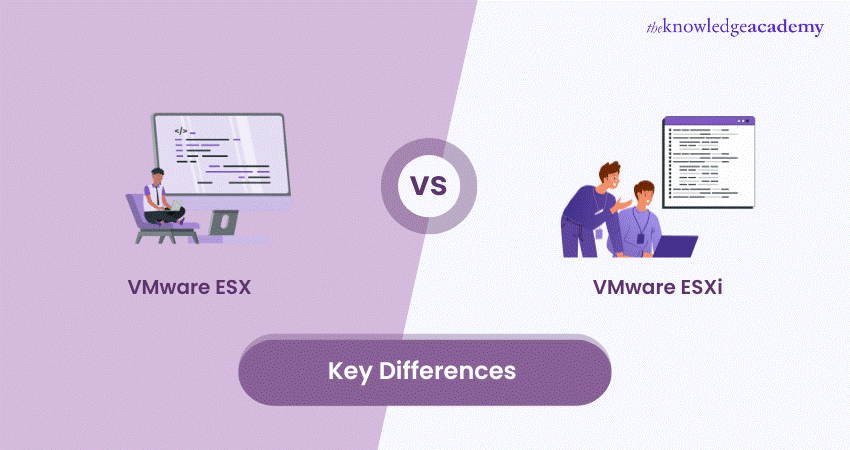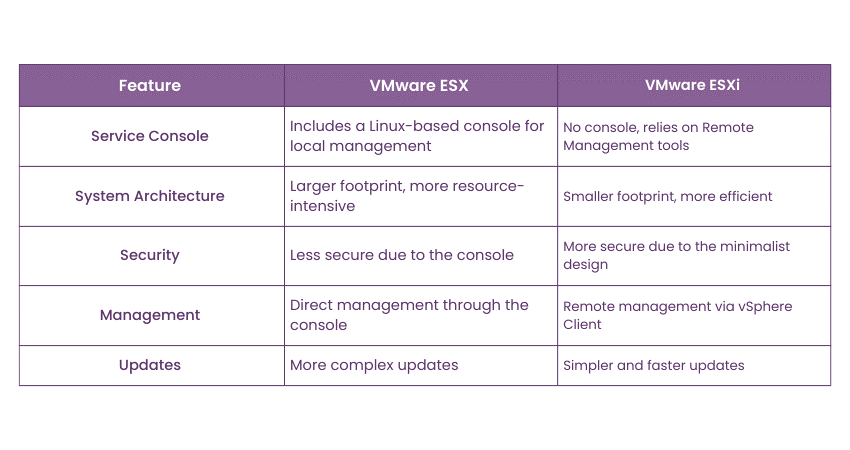We may not have the course you’re looking for. If you enquire or give us a call on 01344203999 and speak to our training experts, we may still be able to help with your training requirements.
We ensure quality, budget-alignment, and timely delivery by our expert instructors.

VMware ESX and ESXi are two of the most widely used type-1 Hypervisors in Virtualisation that have powered over 80% of virtualised workloads globally. These technologies enable organisations to maximise server resources through multiple Virtual Machines on a single physical server. While ESX was an early pioneer with its Linux-based Service Console, ESXi has completely revolutionised space by introducing a lightweight, secure, and efficient architecture.
Continue reading this comprehensive blog to gain insights into VMware ESX vs. ESXi core functionalities and their key architectural differences. Also, learn how they compare in areas such as management, security, resource usage, and updates.
Table of Contents
1) What is VMware ESX?
2) What is VMware ESXi?
3) Key Differences Between VMware ESX and ESXi
a) Service Console
b) System Architecture
c) Validation of Active Directory
d) Resource Usage
e) Management
4) Conclusion
What is VMware ESX?
VMware ESX, an abbreviation for Elastic Sky X, is a type-1 Hypervisor developed by VMware that allows organisations to virtualise their physical servers. A type-1 Hypervisor runs directly on the server hardware without needing to host an operating system (OS), making it highly efficient and seamless.
Furthermore, ESX enables the creation of multiple Virtual Machines (VMs) on a single server which is physical in nature, each functioning as an independent computer with its own operating system and applications.
What is VMware ESXi?
VMware ESXi, short for Elastic Sky X Integrated, is a lightweight, type-1 Hypervisor developed by VMware to virtualise physical servers. Unlike its predecessor, ESXi eliminates the need for a Service Console by operating as a minimalistic Hypervisor that can run directly on server hardware.
This design allows the reduction of the Hypervisor’s footprint and resource usage, further enhancing performance and security. Moreover, ESXi allows administrators to run multiple Virtual Machines (VMs) on a single server, each acting as an independent computer with its own operating system and applications.
Unlock AWS Expertise with Serverless Computing With Amazon Web Services Course – register today!
Key Differences Between VMware ESX and ESXi
Understanding the distinctions between VMware ESX and ESXi is crucial for choosing the right Hypervisor for your virtualisation needs. Here are the key differences between VMware ESX and ESXi:

1) Service Console
VMware ESX includes a Linux-based Service Console that allows administrators to perform management tasks directly on the hypervisor. In contrast, VMware ESXi removes the Service Console, while relying entirely on remote management tools. This reduces the complexity and enhances security by minimising the attack surface.
2) System Architecture
ESX has a larger footprint due to the Service Console, making it more resource-intensive. ESXi, on the other hand, has a streamlined architecture with a significantly smaller hypervisor size, leading to better performance and reduced overhead on server hardware.
3) Validation of Active Directory
ESXi natively supports integration with Active Directory for user authentication, simplifying the management of access controls. In contrast, ESX does not offer this feature natively and requires additional configurations to achieve similar functionality.
4) Resource Usage
Due to its minimalistic design, ESXi consumes fewer system resources, leaving more hardware capacity available for virtual machines. ESX, on the other hand, with its Service Console, uses additional resources, reducing the amount of hardware available for VM workloads.
Dominate Wireless Technology with our LTE Fundamentals Training - kickstart your journey now!
5) Management
VMware ESX allows direct management through the Service Console, providing local control options. While VMware ESXi relies entirely on Remote Management tools like vSphere Client or VMware Host Client, offering a more modern and efficient management experience.
6) Security Measures
ESXi offers improved security by eliminating the Service Console and reducing vulnerabilities associated with local access. ESX’s Service Console, in contrast, although functional, creates additional exposure points that can be targeted in security breaches.
7) Software Patches and Updates
Updating ESXi is simpler and faster due to its lightweight architecture and automated tools like VMware Update Manager. While Updating is more complex in ESX, as it involves patching both the hypervisor and the Service Console separately.
8) Hardware Monitoring
Both ESX and ESXi provide hardware monitoring capabilities, but ESXi integrates with CIM (Common Information Model) providers for more efficient and lightweight monitoring. ESX relies on the Service Console for hardware monitoring, which can be resource-intensive.
9) System Availability
ESXi provides higher system availability due to its lean design, which reduces downtime during maintenance and updates. ESX, with its larger architecture, may require more time and resources to achieve the same level of availability.
Harness IoT Frameworks with our Internet of Things IoT Systems And Applications Training- start your career journey today!
Conclusion
We hope you understand these key differences between VMware ESX vs ESXi. VMware ESX and ESXi are the two powerful Hypervisors that have completely revolutionised virtualisation, each with its own sets of distinct features. While ESX laid the foundation with its Service Console, ESXi can streamline operations with a lightweight, secure design.
Secure your IoT Ecosystems- sign up for our Security And Privacy In Internet Of Things (IoT) Training today!
Frequently Asked Questions
What is the Purpose of ESXi?

The purpose of VMware ESXi is to act as a type-1 Hypervisor to enable efficient virtualisation by directly managing physical hardware and hosting multiple Virtual Machines. It also works to optimise resource utilisation, improves scalability, and simplifies IT management for businesses of all sizes.
How Much RAM is Needed for ESXi?

VMware ESXi requires a minimum of 4 GB RAM; however, 8 GB or more is recommended for typical workloads. For environments running multiple Virtual Machines or resource-intensive applications, allocating additional RAM ensures optimal performance and stability.
What are the Other Resources and Offers Provided by The Knowledge Academy?

The Knowledge Academy takes global learning to new heights, offering over 30,000 online courses across 490+ locations in 220 countries. This expansive reach ensures accessibility and convenience for learners worldwide.
Alongside our diverse Online Course Catalogue, encompassing 19 major categories, we go the extra mile by providing a plethora of free educational Online Resources like News updates, Blogs, videos, webinars, and interview questions. Tailoring learning experiences further, professionals can maximise value with customisable Course Bundles of TKA.
What is The Knowledge Pass, and How Does it Work?

The Knowledge Academy’s Knowledge Pass, a prepaid voucher, adds another layer of flexibility, allowing course bookings over a 12-month period. Join us on a journey where education knows no bounds.
What are the Related Courses and Blogs Provided by The Knowledge Academy?

The Knowledge Academy offers various Advanced Technologies Courses, including Introduction to Virtualisation Technologies, Serverless Computing with Amazon Web Services Course, and Security and Privacy in Internet of Things (IoT) Training. These courses cater to different skill levels, providing comprehensive insights into IoT Engineer Salary.
Our Advanced Technology Blogs cover a range of topics related to cutting-edge innovations and emerging technologies, offering valuable resources, best practices, and industry insights. Whether you are a beginner or looking to advance your technology and IT skills, The Knowledge Academy's diverse courses and informative blogs have got you covered.
Upcoming Advanced Technology Resources Batches & Dates
Date
 Introduction to Virtualisation Technologies
Introduction to Virtualisation Technologies
Fri 4th Apr 2025
Fri 27th Jun 2025
Fri 29th Aug 2025
Fri 24th Oct 2025
Fri 5th Dec 2025






 Top Rated Course
Top Rated Course



 If you wish to make any changes to your course, please
If you wish to make any changes to your course, please


